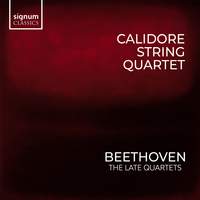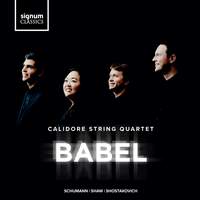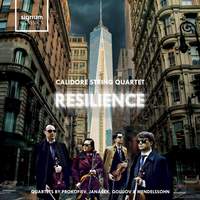Interview,
The Calidore String Quartet record late Beethoven

The New York-based Calidore String Quartet made their mark with two multi-composer albums - Babel, drawing connections between Schumann, Shostakovich and Caroline Shaw, and Resilience, exploring different composers' musical responses to traumatic personal events.
For their latest album, they've chosen to focus in on just one composer, with the late quartets of Beethoven. I spoke to Ryan Meehan, one of the quartet's violinists, about what this music means to the group and what influences have helped shape their approach to it.
You mention that some of the impetus for this recording project came from the suspension of musical life in the early stages of the Covid-19 pandemic. Do you think this album would exist if the pandemic had not hit?
Recording the Beethoven cycle has often been seen as part of a string quartet’s legacy. This was always a goal for our quartet and likely would have been accomplished at some point, but the pandemic allowed us the time to fully commit ourselves over the last two years. With the busy nature of concertizing and touring, one’s recording schedule has to be carefully planned out. With the down during the pandemic, we found ourselves with the ultimate luxury of being able to dive headfirst, and completely immerse ourselves in the amazing world of Beethoven.
Beethoven’s quartets are surely among the most widely performed and recorded chamber music of all time. Are there any particular accounts by other ensembles that you’ve found particularly inspirational (in general, or maybe in their approach to one quartet or movement)?
The Alban Berg quartet were some of our most formative mentors, especially the violinists Gunther Pichler and Gerhard Shulz. Many of our early lessons on Beethoven came from them. Their recorded legacy of the cycle continues to be instructive. Their approach, personal but never overwrought, consistent yet with fantasy, are some of the ideals we strive for in our own interpretation of Beethoven. They emphasized highlighting the startling shifts in Beethoven’s music, through emphasized sforzandos and abrupt and meticulously executed shifts in dynamics.
Their slow movements are magical. They imbue soul into the immortal lines of these movements, most notably the slow movement of op. 135. Without stretching the pulse or exaggerating the expression into mannerisms, they create a suspension and timelessness through the timbre of their sound and slight undulation of their phrasing. Subtlety is so often the key to unlocking the markings in Beethoven’s intimate writing.
We’re accustomed to viewing Beethoven as a heroic genius creating pure art for art’s sake, and his symphonies and sonatas certainly bear this out. But doesn’t chamber music of this period still have a bit of the commercial and the domestic about it – perhaps even what one might term Gebrauchmusik?
While Beethoven's string quartets would have been played by many amateurs inside the comforts of one's own home, it is difficult to imagine a body of work that is more "art for art's sake" than his 16 string quartets. Especially when taking a look at his late quartets, we see Beethoven constantly tossing aside pre conceived notions of structure, harmony, difficulty, and overall length of works. We are nearly 200 years removed from the composition of op. 130 and musicians are still to this day unraveling the complexities and sheer cacophony of the Grosse Fuge which was originally intended to close the work! In all of these late works one can see Beethoven not only pushing the boundary of what can be done with the form, but also catapulting music into a new era. Without these works the next two hundred years of chamber music composition would have looked completely different.
After such a weighty project, where do you see your quartet going next? Do you anticipate more “concept-album” recordings like Resilience or Babel, with a unifying theme rather than a focus on a single composer?
Having done such a large undertaking exploring one composer, we’ve discovered how multidimensional Beethoven’s works are. I think it’s opened the possibility of concentrating again on a single composer having been so rewarded with our in-depth dive into Beethoven. We will always consider compelling programs of different composers (new and old) for an album in the future though. Who knows what may come!
Calidore String Quartet
Available Formats: 3 CDs, MP3, FLAC, Hi-Res FLAC
Calidore String Quartet
Available Formats: CD, MP3, FLAC, Hi-Res FLAC
Calidore String Quartet
Available Formats: CD, MP3, FLAC, Hi-Res FLAC





